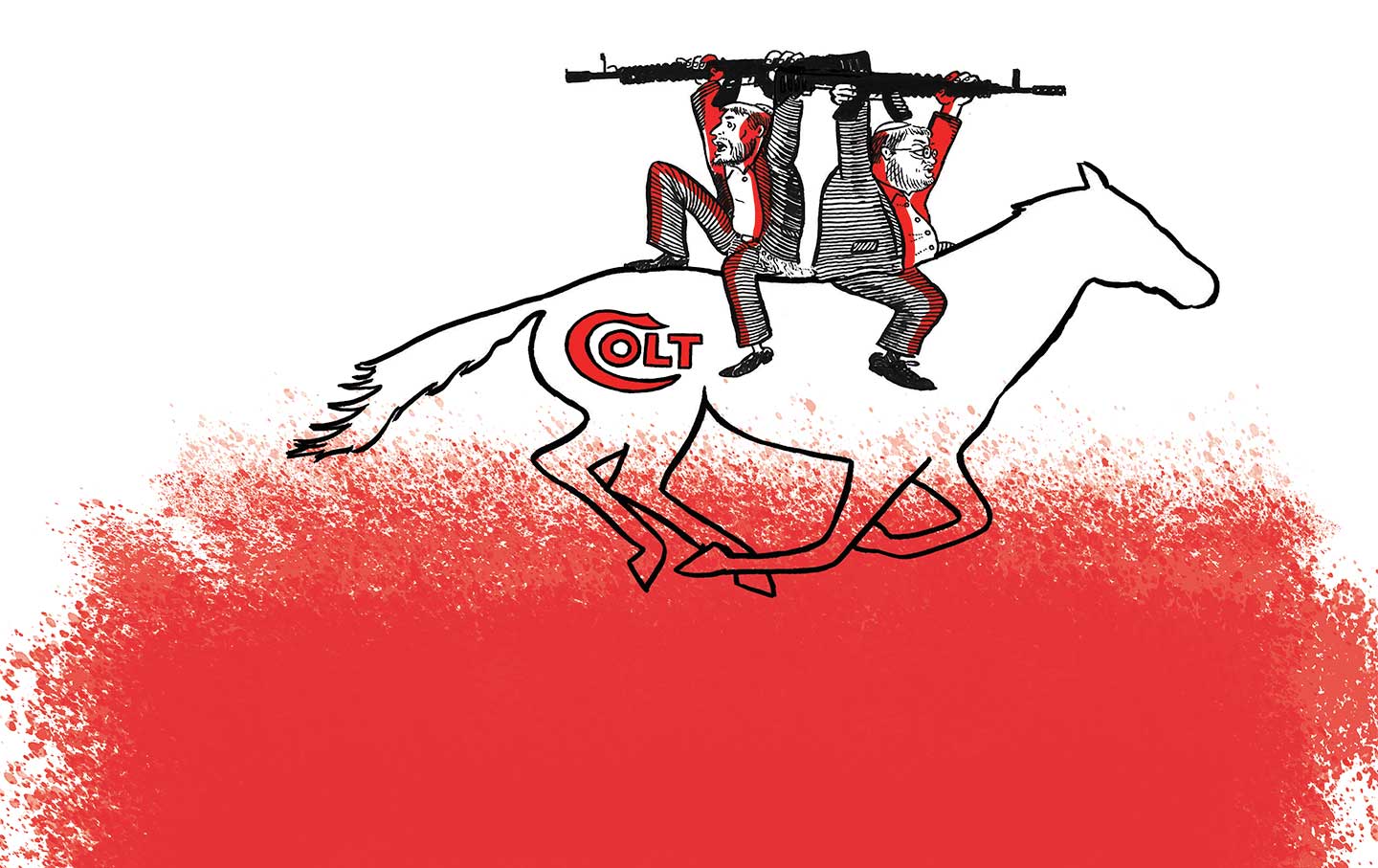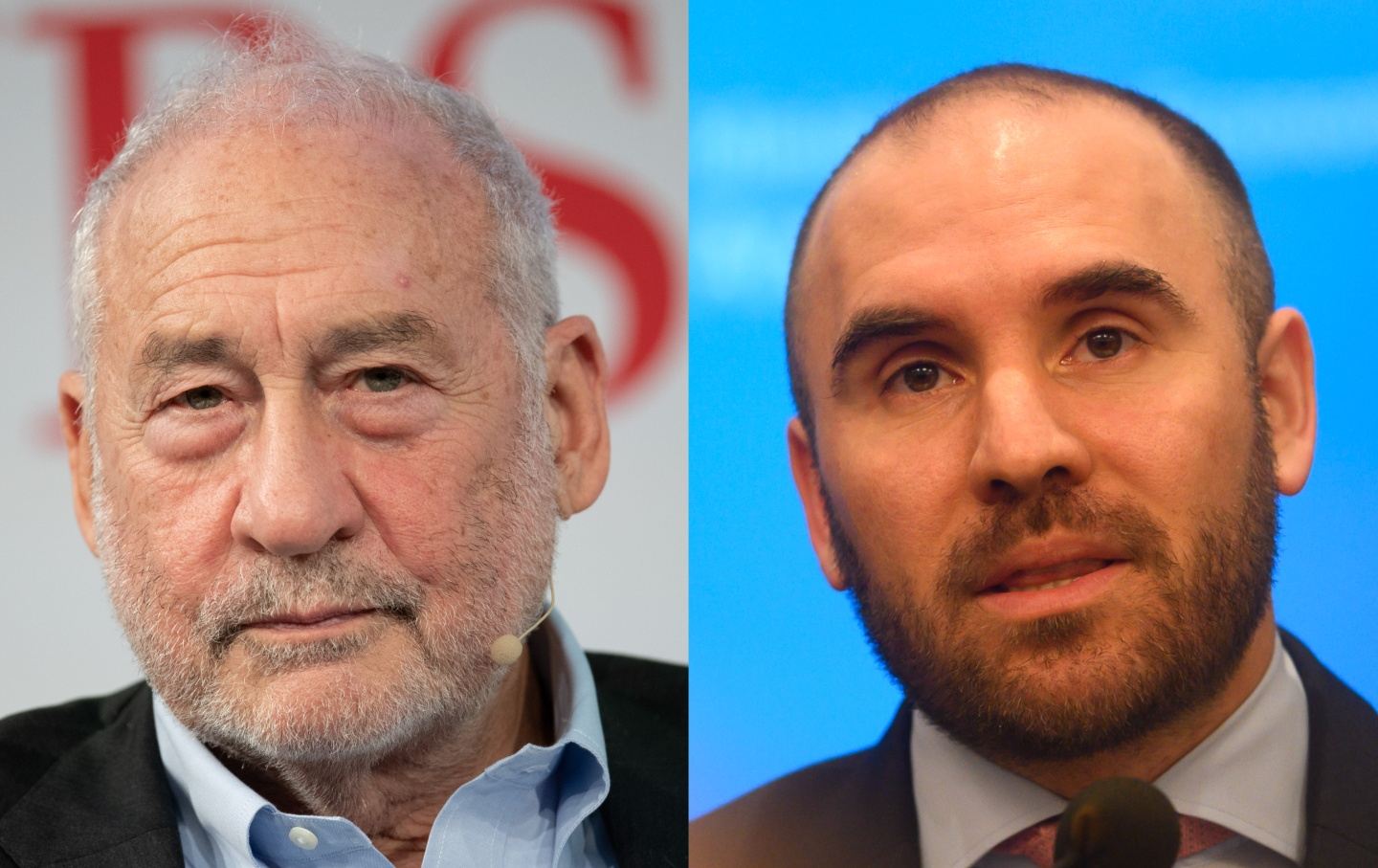These Corporations Are the True “Winners” of the War on Gaza
From Colt to Caterpillar, American companies are earning big profits off of Israel’s ongoing assault on Gaza, turning the horrors of war into boardroom victories.
There is no victory to be achieved by Israel, or by its American sponsor, in its merciless devastation of Gaza. This was evident as far back as October, when many of us began warning that Israel’s onslaught bore all the hallmarks of America’s forever wars, but the horror and chaos of the last few weeks should convince any remaining doubters.
Hamas itself made a mockery of Israel’s stated ambitions when, despite Israeli assurances that the southern city of Rafah was the group’s final stronghold, it initiated guerrilla attacks in May on the Israeli military in the north, heralding the insurgency that likely awaits Israel the longer it remains in Gaza. Despite this, Prime Minister Benjamin Netanyahu continued to insist on “total victory,” evading a clear response to President Joe Biden’s cease-fire proposal, while the Israeli right simply rejected it. Biden remains snared in the mess he helped make: As this article went to press, he was still shopping a cease-fire proposal that seemed as unlikely to bring peace as it was to save his reelection campaign or head off what his director of national intelligence warned may be a “generational impact on terrorism.” And all the while, Palestinians have continued to suffer, enduring starvation and bombs that have killed more than 37,000 people.
Still, just because a war cannot be won does not mean that it lacks for winners.
On May 14, days after Israel moved forward with its invasion of Rafah, Biden informed Congress that his administration would also move forward with providing Israel another $1 billion worth of weapons. It was part of more than $12.5 billion in military aid the US had given to Israel since October 7, and it was a full reversal of Biden’s earlier decision to pause a weapons shipment to Israel over its imminent move on Rafah. “This is just another example of [the Biden administration] muddying their message and undermining any real strength behind the hold,” an arms-export expert told the Wall Street Journal.
The move also demonstrated the trajectory of US foreign policy in the Middle East. Since 1945, the United States’ primary objective in the region has been to ensure access to cheap oil, and it has been willing to prop up whatever tyrants can secure that interest. More recently, US foreign policy has added regional integration to that imperative, which it has sought to achieve not through peace accords but through weapons deals.
These deals are key to Biden’s vision for the endgame in Gaza. Building on the Trump administration’s F-35-sealed Abraham Accords, Biden aims to secure some nebulous Israeli promise to one day accept a Palestinian state in exchange for normalization with Saudi Arabia, the latter to be obtained by giving Crown Prince Mohammed bin Salman a nuclear program. Bin Salman, a man known for obliterating swaths of Yemen and having a mildly critical journalist dismembered, promises that he is interested in such a program only as an energy alternative—unless, that is, Iran goes nuclear. It says everything about the fundamental dynamics of US foreign policy that this was Biden’s plan for the Middle East before October 7—except without much of anything for the Palestinians. Tellingly, in urging Israel to embrace the cease-fire initiative, Biden pitched Israel on being “part of a regional security network to counter the threat posed by Iran,” a reference to the envisioned US-Saudi deal.
Whatever the debates about the decline of US hegemony, the global arms market is a place where American power is growing. The United States was responsible for 34 percent of all arms exports from 2014 to 2018, according to SIPRI, an independent research institute. By 2023, that number had grown to 42 percent. Some 38 percent of US arms exports during that time went to the Middle East, with Israel accounting for 3.6 percent; Israel gets 69 percent of its arms imports from Washington.
That America’s imperial wars have been agonizing failures has obscured the fact that there have been winners—and the same goes for this latest US-backed assault. Those winners are in the boardrooms of the companies shown here, from a tally assembled by the American Friends Service Committee. We highlight them not because of any company’s particular instrumentality in the bloodshed but because they are unexceptional, representing routine operations within Israel’s machinery of oppression. Some are not even primarily known as weapons manufacturers. Their wins compound every day that Israel continues its genocide in Gaza.

COLT
As all eyes have been riveted on Gaza these past nine months, Israeli settlers have seized the opportunity to intensify their vigilante attacks on Palestinians in the West Bank, often with the help of American-made weapons. In November, the Israeli government ordered 24,000 semiautomatic and automatic rifles from US companies—most of them from Colt. Israel indicated that at least some of the rifles would go to civilians, likely as part of National Security Minister Itamar Ben-Gvir’s plan to distribute guns to settler “security” squads. Although The New York Times reported concern within the State Department that the weapons would be used on civilians—as part of the hyped-up settler push to drive Palestinians from their land—the Biden administration ultimately approved the deal. On May 1, the Defense Department announced a $26.6 million contract with Colt for the delivery of the guns.
Colt was operating in accordance with its settler traditions. The gun manufacturer, which made revolvers for the discerning frontiersman, passed into settler legend when the Texas Rangers used its guns to suppress the Comanche in the 1840s. By the 1870s, its fabled “Peacemaker” revolver had become such a fixture of frontier life that it’s sometimes hailed as “the handgun that won the West.” Or, as Virginia Tech professor Lee Vinsel wrote in a 2020 essay reviewing a social history of the gunmaker, Colt supplied “a technology of Manifest Destiny.” In providing the means for Israelis to steal Palestinian land, Colt merely continues its legacy.

FORD MOTOR COMPANY
It may seem ironic that a company founded by the United States’ most notorious antisemite supplies the Jewish state with armored vehicles. But the rabid ethno-nationalism animating both Henry Ford and the current Israeli government helps square the circle. In December, Israel’s Ministry of Defense announced that it had accepted a new shipment of military equipment, posting a picture of a Ford F-350 truck outfitted with metal deflection grilling on its windows. It was one of several Ford chassis in the IDF’s motor pool. According to the IDF, it has also equipped the F-350 with advanced sensors and cameras to operate as an unmanned ground vehicle and used it to patrol Gaza’s borders for more than a decade.
Ford built its first assembly plant in Israel shortly after the Six-Day War of 1967. Its decades-long business there has been crucial to its attempts at expunging the stain of its founder’s antisemitism. “I don’t mind saying I was influenced in part by the fact that the company still suffers from a resentment against the antisemitism of the distant past,” Henry Ford’s grandson and successor explained of his decision to open the factory in Israel. The elder Ford’s infamous newspaper, The Dearborn Independent, was “unequivocally antisemitic,” The Jerusalem Post noted in 2019, but “it also seems to contain a sort of perverse, couched respect for Zionism.”

CATERPILLAR INC.
Caterpillar, the construction equipment giant, isn’t a weapons company. But when it comes to efforts to create what Israel calls “facts on the ground,” some of the most powerful weapons don’t shoot. They turn dirt.
Caterpillar equipment has been turning a lot of dirt in Gaza in recent months. Its bulldozers have been particularly busy digging a wide highway stretching from the fence on Gaza’s eastern border near the Nahal Oz kibbutz to al-Rashid Street, which runs along the Mediterranean coast. The purpose of this highway, known as the Netzarim Corridor, is to facilitate the IDF’s access across Gaza for years to come while effectively cutting the Strip in two. At the same time, the IDF has been using “bulldozers and controlled explosions,” The Wall Street Journal has reported, to construct a buffer zone along its unilaterally drawn boundaries of Gaza, shrinking the territory permitted to Palestinians.
These fearsome bulldozers are not your standard hunk of heavy machinery. For years, Israel has used Caterpillar’s D9, a bulldozer up-armored to withstand missile and RPG fire, to demolish Palestinian homes in the West Bank and Gaza. It was a Caterpillar D9 that killed the American student activist Rachel Corrie in Rafah in 2003 as she tried to stop it from flattening a home. The following year, during the waning days of the Second Intifada, Human Rights Watch called on Caterpillar to stop selling the D9 to Israel, which uses it to “raze Palestinian homes, destroy agriculture and shred roads in violation of the laws of war.”
James Owens, Caterpillar’s CEO at the time, responded with a letter saying that the company did “not have the practical ability or legal right to determine how our products are used after they are sold.” Now Caterpillar bulldozers are reportedly being fitted for semiautonomous operations.

PALANTIR
While Google, another company with close ties to the Israeli war machine, has been wracked with internal dissent over its work in Israel, the AI firm Palantir proudly promotes its partnership with the state. In January, CEO Alex Karp met with Israeli President Isaac Herzog and boasted about Israel’s appetite for Palantir products (he was joined by cofounder Peter Thiel). Although Karp didn’t specify which ones at the time, Palantir has confirmed (during an analyst call) that Israel uses a defense-tech data ecosystem called Palantir Government Web Services. In an interview with Bloomberg, Karp said that under normal circumstances, he would agree with calls to restrict AI applications used by the military. “But the reality of our life now, as Israel knows, is our adversaries are real, dangerous and they go so far outside the norms of behavior,” he said.
Karp’s posture as a reluctant peddler of militarized AI deserves skepticism. Palantir is one of the signature companies of the War on Terror. It got its start as a data miner in the mid-aughts with the help of an infusion of capital from In-Q-Tel, the investment arm of the CIA. From there, its products moved to the battlefields of Afghanistan, thanks in part to a push by a then-obscure Army general named Mike Flynn. During Donald Trump’s presidency, Palantir’s schmoozing reaped a data-mining contract with the Army worth more than $800 million and another with Immigration and Customs Enforcement worth up to $42 million. The company responded to criticisms of its role in hunting immigrants by portraying itself as more patriotic than the rest of the tech sector. “Silicon Valley is…telling the average American, ‘I will not support your defense needs,’” Karp declared.
You can see why Netanyahu likes these guys.

In 2021, Google and Amazon won a $1.2 billion contract for the Israeli government’s cloud-computing system known as Project Nimbus. Although little public information is available about how Nimbus works, Sam Biddle, a reporter for The Intercept who obtained internal Google documents, described the company’s role as providing Israel with crucial advancements in artificial intelligence—specifically, with “capabilities for facial detection, automated image categorization, object tracking, and even sentiment analysis that claims to assess the emotional content of pictures, speech, and writing.”
From the start, Nimbus has drawn protest from Google workers. In 2022, Ariel Koren resigned from her position as a marketing manager, claiming that the company had retaliated against her for organizing against Nimbus. “Google systematically silences Palestinian, Jewish, Arab, and Muslim voices concerned about Google’s complicity in violations of Palestinian human rights,” she wrote in a letter explaining her resignation.
Earlier this year, the Israeli journalist Yuval Abraham published an explosive investigation of the ominous ways the IDF uses AI in its assault on Gaza. A dystopian program called Lavender generates targets for the military based on a person’s AI-assessed receptivity to militancy. This engine of mass killing—Abraham reported that Lavender generated some 37,000 targets during the early stages of the invasion—is now an end product of the expansive surveillance data that Israel maintains on Palestinians. It is unknown whether Nimbus contributes to Lavender. But Lavender shows where Israel intends to direct its AI capabilities.
Access Now, a digital rights organization, wrote to Sundar Pichai, CEO of Google and Alphabet, in May to ask him to clarify what role, if any, Google has played in Israel’s human rights violations in Gaza. “The horrifying use of AI warfare in Gaza,” the group noted, “and Google’s expanding relationship with the Israeli government begs the question: To what extent does the Israeli military and intelligence apparatus employ Google’s cloud computing and AI services, infrastructure, and systems for the mass slaughter of innocent civilians and the mass destruction of the Gaza Strip?”
The group is still waiting for a response.

THE ISRAELI ARMS EXPORT INDUSTRY
As much as stateside attention has understandably been focused on the US provision of arms to Israel’s war machine, Israel has built its own booming military export industry. According to a recent analysis by SIPRI, Israel is the world’s ninth-largest arms dealer, with sales, according to the Israeli government, as high as $12.5 billion in 2022. Its main clients include India (37 percent of defense exports), the Philippines (12 percent), the United States, other signatories of the Abraham Accords, and other nations known for their human rights violations. While many nations refuse to supply Myanmar’s ruling junta with weapons following its documented attacks on hospitals and other civilian targets, for instance, Israel has made at least four arms shipments to Myanmar since 2018, Haaretz reported in 2022.
Alongside such coveted exports as drones and air defense systems, Israel has increasingly supplied countries with its sophisticated surveillance technology. The most infamous example is the NSO Group’s Pegasus spyware, which exploits vulnerabilities in Apple’s iMessage system to extract data from unsuspecting users without them so much as having to click on a sketchy link. Pegasus appeared on the phones of people close to the murdered Saudi journalist Jamal Khashoggi, despite the denials of the NSO Group. Years later, NSO sold Pegasus to most of the Arab signatories of the Abraham Accords—and when Saudi Arabia’s Pegasus license expired, The New York Times reported, bin Salman called Netanyahu and successfully got it restored.
This is surely a preview of what is to come now that Israel is using AI to generate targets for military operations. What happens in Gaza will not stay in Gaza for long.








